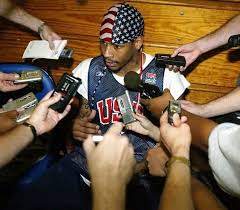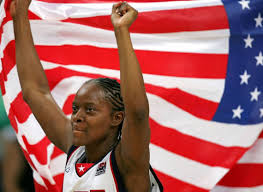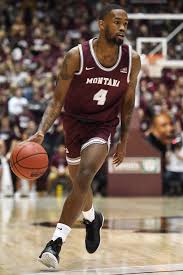The NBA Finals date back to 1947 (when they were known as the Basketball Association of America Finals) and the very 1st NCAA tourney was held in 1939. Olympic basketball competition is even older: it debuted as a demonstration event in 1904 and the men’s version became a medal sport in 1936, with the women finally getting their chance to go for the gold in 1976. The United States has dominated Olympic basketball competition from the start: the men have won 15 gold medals in the 18 tournaments they have participated in during the past 84 years, while the women have won 8 gold medals in the 10 tournaments in which they have competed during the past 44 years. Those of you who were looking forward to the 2020 Olympics opening ceremonies in Tokyo on July 24, 2020 will have to wait an extra 364 days, as the coronavirus caused a postponement until July 23, 2021. Due to the absence of college basketball since mid-March, HoopsHD’s Jon Teitel decided to fill the void by trying to interview as many prior Olympic players/coaches as possible so that you have something to read this summer while not watching the Summer Games. We continue our coverage by chatting with Kent Babb, author of “Not a Game: The Incredible Rise and Unthinkable Fall of Allen Iverson”, about Allen Iverson making the NBA Finals in 2001 and talking about practice. Today marks the 16th anniversary of Iverson scoring 16 pts vs. Australia in Olympic round-robin pool play.
At Bethel High School Iverson was named AP High School POY in both football/basketball and won the AAA Virginia state title in both sports: which sport was he best at, and which 1 did he enjoy the most? I am a little skeptical that he was actually a better football player than basketball player, mostly because of his size. Iverson was so quick/dominant on the basketball court in a sport that showcases the individual and actually allows speed to overshadow size. I do not doubt that he was a terrific football prospect so maybe I just find it hard to believe that he was better at anything than he was at basketball.
In 2 years at Georgetown he set the school record for career scoring average (22.9 PPG) and was named Big East DPOY both years: how was he able to balance his offense with his defense? The offensive success was due to the fact that Coach John Thompson just turned him loose, which is something he had never done before, and Iverson could cut through opposing defenses on the way to the basket like nobody else could. The defense was a combination of Thompson’s system/Iverson’s speed. He was fearless and nobody could match him in terms of quickness, which gave him the ability to run down the floor and set up before pretty much anybody else. He did not care how big/skilled his opponent was: Iverson was happy to mix it up on the court and then try to get a steal no matter what.
In the summer of 1996 he was drafted 1st overall by Philadelphia (becoming the shortest 1st overall pick ever at 6’ tall): did he see that as a validation of his college career, or the realization of a lifelong dream of reaching the NBA, or other? I think it was simpler than any of that. He was getting an NBA contract, which to him meant providing for his mother/girlfriend/baby daughter/disabled sister. He also liked helping out his friends from Newport News, and for the first time in any of their lives 1 of them had access to a seemingly bottomless pit of money. I am sure that deep down there was some pride in being the top overall pick but Iverson never struck me as anyone who needed validation. He did, however, need money.
In 1997 he was named NBA ROY after averaging 23.5 PPG/7.5 APG/2.1 SPG: how was he able to come in and dominate right from the start? At that time the NBA was still mostly a big man’s league. Michael Jordan was the outlier, and it was his speed/perimeter game/detail-oriented approach that made him so dominant despite an overall lack of size (and Jordan was 6’6”). Iverson, though, caught everybody by surprise and was just so much faster than everybody else. The fact that he also was not scared of taking the ball to the hoop, no matter who was waiting for him there, was just something that was almost impossible to game plan for defensively.
Take me through the 2001 playoffs:
He finished the regular season by being named MVP: how much extra pressure did that put on him to try to lead the 76ers to a title? Iverson put pressure on himself because he knew that the Sixers were short on talent, especially in a head-to-head match-up against the Lakers. This is the first time that Iverson kind of took on a Jordan-like approach: not relying only on his own natural gifts but also on some conditioning/nutrition/training. It was never the same as Jordan, or as most other elite athletes, but for Iverson it was the best that he would ever do. I think that if the Sixers had known he would take those things that seriously then they would have added more talent around him…but it would have been foolish to think that Iverson was going to work that hard.
In the Eastern Conference Semifinals he scored 54 PTS in a Game 2 win, watched Vince Carter score 50 PTS in a Game 3 loss to Toronto, scored 52 PTS in a Game 5 win, and had 21 PTS/16 AST in a 1-PT win in Game 7 after Carter’s long jumper at the buzzer bounced off the rim: did the series simply turn into a 1-on-1 battle to see who was the best player on the court? Iverson saw every match-up as a one-on-one battle, usually against the biggest star on the other team. There was no way that he was going to let Vince Carter upstage him, even if there is an argument to be made that the Raptors had the better top-to-bottom team.
In Game 1 of the Finals he scored 48 PTS in a 6-PT OT win over the Lakers (their only loss during that postseason): why did he decide to step over Tyronn Lue after hitting a crucial shot in the final minute? To him this was a respect thing: he had learned days earlier that Lue had been imitating Iverson during Lakers’ practices. He refused to pass, would not stop talking s—, and took crazy shots every chance he got. That pissed Iverson off, especially since he did not see Lue as someone who deserved to be on the same court as him, let alone as a comparison to him. It obviously made sense for Lakers’ coach Phil Jackson to use somebody to mimic Iverson from a strategy/preparation standpoint but Iverson did not see it that way. He saw a middling player acting like Iverson as a sign of disrespect, and stepping over Lue was his way of expressing his anger at being insulted like that.
In the 2002 Eastern Conference 1st round he scored 31 PTS in a 33-PT loss at Boston in the decisive game 5 (Paul Pierce scored 46 PTS/8-10 3PM as the Celtics made a playoff-record 9 threes in the 4th quarter), then 4 days later made his legendary “we’re talking about practice” comments: how much importance did he place on practice during his playing days, and should we care since it obviously did not keep him from having a great career? I think that the 2001 season showed what Iverson could have become. If he had truly been dedicated to training/nutrition/fundamentals then it is possible he would have been among the top-10 or top-15 players of all-time, not just 1 of the top-10 or top-15 pound-for-pound players of all-time. It is hard to know whether he would have won a championship because the Lakers were just so dominant during that time, but he would have had other chances. I have gone back and forth on this: if he had actually trained like that then he would have lost some of the “everyman” quality that makes him so legendary. Iverson almost literally rolled out of bed (whenever that was) and went to the arena. What we saw was unvarnished raw talent. If he had taken himself and his game more seriously, would he have been as fun? Maybe it would have taken away from what we loved about Iverson to begin with so I am unsure which version I would have preferred: I will always wonder though.
Former referee Tim Donaghy said that in a January 6, 2007 game between Denver and Utah he and the other 2 refs agreed not to give Iverson any favorable calls as a way to “teach him a lesson” for criticizing referee Steve Javie a few days earlier: do you think that is true, and how was Iverson viewed by the referee community? Iverson talked s— to everybody, including the officials. Some officials thought that he was entertaining/childlike but others got pissed off. I do not know the truth of that Donaghy story personally but I would not doubt it.
He was inducted into the Hall of Fame in 2016: when people look back on his career, how do you think that he should be remembered the most? Everybody says this but it is true: his heart and refusal to quit is why I fell in love with Iverson’s game. I wrote in my book that he was identifiable, unlike a lot of other NBA stars, because he was small and drank and smoked and ate wings. Everybody wanted to be like Mike but nobody actually thought that was possible. You kind of did think that you could be like Iverson because he was not superhuman, although he had superhuman skills. The fact that he preferred cheap beer/crappy bars just grew that legend. He is all of us who never grew to 6’3” or taller.










